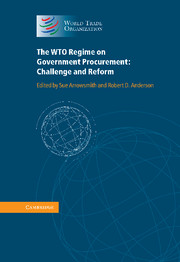Book contents
- Frontmatter
- Contents
- List of contributors
- Foreword by Pascal Lamy
- Perspective of the Chairman of the WTO Committee on Government Procurement, Nicholas Niggli (Switzerland)
- Preface
- Disclaimer
- PART I The WTO regime on government procurement
- PART II Expanding the scope of the Agreement on Government Procurement: accession and coverage
- 2 Forging a more global procurement market: issues concerning accessions to the Agreement on Government Procurement
- 3 Accession to the Agreement on Government Procurement: the case of China
- 4 India's possible accession to the Agreement on Government Procurement: what are the pros and cons?
- 5 The benefits for developing countries of accession to the Agreement on Government Procurement: the case of Chinese Taipei
- 6 The coverage negotiations under the Agreement on Government Procurement: context, mandate, process and prospects
- 7 Canada's sub-central government entities and the Agreement on Government Procurement: past and present
- 8 The procurement of state trading enterprises under the WTO Agreements: a proposal for a way forward
- 9 Addressing purchasing arrangements between public sector entities: what can the WTO learn from the EU's experience?
- PART III Revision of the procedural rules and other transparency provisions of the Agreement on Government Procurement
- PART IV Developing countries in the WTO procurement regime
- PART V Economic and social development (horizontal policies) in government procurement
- PART VI Enforcement and remedies
- PART VII Multilateralism and regionalism
- PART VIII Challenges and new directions
- Index
5 - The benefits for developing countries of accession to the Agreement on Government Procurement: the case of Chinese Taipei
from PART II - Expanding the scope of the Agreement on Government Procurement: accession and coverage
Published online by Cambridge University Press: 07 September 2011
- Frontmatter
- Contents
- List of contributors
- Foreword by Pascal Lamy
- Perspective of the Chairman of the WTO Committee on Government Procurement, Nicholas Niggli (Switzerland)
- Preface
- Disclaimer
- PART I The WTO regime on government procurement
- PART II Expanding the scope of the Agreement on Government Procurement: accession and coverage
- 2 Forging a more global procurement market: issues concerning accessions to the Agreement on Government Procurement
- 3 Accession to the Agreement on Government Procurement: the case of China
- 4 India's possible accession to the Agreement on Government Procurement: what are the pros and cons?
- 5 The benefits for developing countries of accession to the Agreement on Government Procurement: the case of Chinese Taipei
- 6 The coverage negotiations under the Agreement on Government Procurement: context, mandate, process and prospects
- 7 Canada's sub-central government entities and the Agreement on Government Procurement: past and present
- 8 The procurement of state trading enterprises under the WTO Agreements: a proposal for a way forward
- 9 Addressing purchasing arrangements between public sector entities: what can the WTO learn from the EU's experience?
- PART III Revision of the procedural rules and other transparency provisions of the Agreement on Government Procurement
- PART IV Developing countries in the WTO procurement regime
- PART V Economic and social development (horizontal policies) in government procurement
- PART VI Enforcement and remedies
- PART VII Multilateralism and regionalism
- PART VIII Challenges and new directions
- Index
Summary
Introduction
On 9 December 2008, the World Trade Organization (WTO) Committee on Government Procurement adopted the accession of the Separate Customs Territory of Taiwan, Penghu, Kinmen and Matsu (Chinese Taipei) to the Agreement on Government Procurement (GPA). After completing the relevant domestic legislative procedures, Chinese Taipei delivered its accession document to the WTO in June 2009 and formally became the forty-first signatory to the GPA on 15 July 2009.
Accession to the GPA could be a difficult decision for many developing countries. This is mainly due to the fear that the accession could lead to economic losses in their countries and negatively affect the development of their industries. Many developing countries might have reservations about whether there will be recognizable benefit to gain. Chinese Taipei faced similar difficulties when it had to make a decision about participating in the GPA.
However, looking back on the decision, it must be said that the decision to accede to the GPA was the right one for Chinese Taipei. Although it is not easy to quantify the economic gains arising from the accession to the GPA comprehensively, speaking generally, it could be fairly argued that the accession has been beneficial to Chinese Taipei from many perspectives.
This chapter will examine the factors contributing to Chinese Taipei's accession to the GPA, the commitments made by Chinese Taipei under the GPA, and the qualitative benefits to Chinese Taipei as a result of its accession.
- Type
- Chapter
- Information
- The WTO Regime on Government ProcurementChallenge and Reform, pp. 140 - 148Publisher: Cambridge University PressPrint publication year: 2011
- 2
- Cited by



